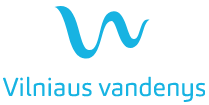There is a global trend — more and more customers are demanding from service providers an appropriate and responsible approach to the nature around us. Most often, the consumers’ choice and satisfaction with services is also determined by the fact if they company is compliant with environmental standards, cares about nature and pursues sustainability in its activities.
For many years, the ambition of “Vilniaus Vandenys” was to operate by following environmental standards. But as we followed the path of change, we realized that it was not enough anymore. We need to start thinking not only about key performance indicators — efficiency, performance — but also about sustainability of activities, harmonious activities with the environment, faster use of renewable energy sources in our activities, green energy.
The new strategic direction of “Vilniaus Vandenys” — environmental protection — has combined the goals set for the next decade — consistent improvement of wastewater treatment indicators, infrastructure and equipment upgrading and modernization, sustainable development of water supply and sewerage networks, smart digitisation of activities and the introduction of future technologies such as sludge recycling, crude energy extraction and utilization in activities, etc.
The company is currently implementing 5 renewable energy projects
Nature is close to home, let’s not pollute — let’s take care together!
Everyone can contribute to a cleaner and healthier environment — taking care not only of the immediate environment of our home, but also small and effortless steps to ensure nurturing and conservation of the nature around us.
The use of plastic packaging, use of strong chemicals in the household, improper disposal of waste, and sometimes maybe just ignorance causes great harm to nature and people themselves. After all, the household of each resident is directly related to sewerage and what is found in water bodies.
“Vilniaus Vandenys” invites you to look into what we can do today to make the environment cleaner. It all depends on our choices and responsible behaviour.
Did you know that…
What must not be thrown in the WC pans or sinks
- Paper napkins and paper towels, multi-layer scented toilet paper.
They do not dissolve in water as quickly as toilet paper.
- Cat litter
Even if the packaging states that the litter is soluble in water, clay particles swell from the water and clog the sewer pipes.
- Hair
It will not dissolve in water and will collect everything along the way.
- Interdental cleaning floss
The floss is like a net, it collects all the rubbish and clogs the WC pan and sewer pipes.
- Condoms, cigarette butts, cotton swabs and cotton pads
These are excellent means for clogging the pipeline.
- Diapers, sanitary pads
The gel in the diapers does not dissolve, on the contrary — it swells when wet, and clogs the pipes.
- Oil, fat
In water, oil cools down and gets into pieces that clog the pipes.
- Salad dressings, seasonings and mayonnaise
It perfectly sticks to each other waste products.
- Bleach
This is a strong chemical cleaner that should not settle in pipelines due to the substances in its composition.
- Chewing gum
It will never dissolve and can stick to other water-insoluble objects.
- Stickers on dishes or fruits
Residents like to peel them under running water in the sink, but they also get stuck in the pipeline.
- Coffee grounds
Almost everyone pours them into the sink, but coffee grounds are one of the most popular reasons why pipelines get clogged.
Why to choose a flask instead of drinks bottled in plastic?
- Of the 8.3 billion metric tons of plastic produced, only 9 percent are recycled.
- In 2020, the amount of plastic waste in the oceans exceeded the amount of fish.
- We involuntarily eat about 5 grams of plastic a week — that’s about as much as our credit card weighs.
- During the lifetime, a person eats about 20 kilograms of various plastic, which is certainly not favourable to our health.
In Vilnius city, you can fill your portable flasks with water comfortably and free of charge from the outdoor drinkers installed by “Vilniaus Vandenys”, the location of which and contribution of which to the conservation of nature can be found on the interactive MAP.



